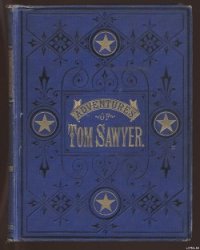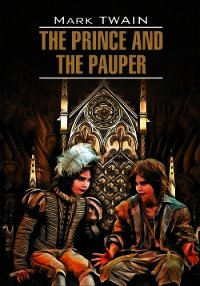Английский язык с Марком Твеном. Принц и нищий (Mark Twain. The Prince and the Pauper) - Twain Mark (читать хорошую книгу полностью .txt) 📗
He came to enjoy being conducted to bed in state at night, and dressed with intricate and solemn ceremony in the morning. It came to be a proud pleasure to march to dinner attended by a glittering procession of officers of state and gentlemen-at-arms; insomuch, indeed, that he doubled his guard of gentlemen-at-arms, and made them a hundred. He liked to hear the bugles sounding down the long corridors, and the distant voices responding, 'Way for the King!'
He even learned to enjoy sitting in throned state in council, and seeming to be something more than the Lord Protector's mouthpiece. He liked to receive great ambassadors and their gorgeous trains, and listen to the affectionate messages they brought from illustrious monarchs who called him 'brother.' Oh, happy Tom Canty, late of Offal Court!
He enjoyed his splendid clothes, and ordered more; he found his four hundred servants too few for his proper grandeur, and trebled them. The adulation of salaaming courtiers came to be sweet music to his ears. He remained kind and gentle, and a sturdy and determined champion of all that were oppressed, and he made tireless war upon unjust laws; yet upon occasion, being offended, he could turn upon an earl, or even a duke, and give him a look that would make him tremble. Once, when his royal 'sister,' the grimly holy Lady Mary, set herself to reason with him against the wisdom of his course in pardoning so many people who would otherwise be jailed, or hanged, or burned, and reminded him that their august late father's prisons had sometimes contained as high as sixty thousand convicts at one time, and that during his admirable reign he had delivered seventy-two thousand thieves and robbers over to death by the executioner, the boy was filled with generous indignation, and commanded her to go to her closet, and beseech God to take away the stone that was in her breast, and give her a human heart.
Did Tom Canty never feel troubled (разве Том Кэнти никогда не чувствовал себя обеспокоенным) about the poor little rightful prince (за бедного маленького законного принца) who had treated him so kindly (который обошелся с ним так добро), and flown out (и вылетел = бросился наружу; to fly — летать) with such hot zeal (с такой горячей истовостью) to avenge him (чтобы отомстить за него) upon the insolent sentinel (грубому часовому) at the palace gate (у дворцовых ворот)? Yes; his first royal days and nights (да; его первые королевские дни и ночи) were pretty well sprinkled (были весьма забрызганы = насыщены) with painful thoughts about the lost prince (тягостными мыслями о потерявшемся принце; to lose — терять), and with sincere longings for his return (и искренними желаниями его возвращения) and happy restoration (и счастливого восстановления = возвращения) to his native rights and splendors (к его врожденным правам и великолепию). But as time wore on (но пока время тянулось; to wear on — медленно тянуться /о времени/), and the prince did not come (и принц не приходил = не возвращался), Tom's mind became more and more occupied (разум Тома становился все более и более занятым) with his new and enchanting experiences (его новыми и пленительными переживаниями), and by little and little (и понемногу) the vanished monarch (пропавший монарх) faded almost out of his thoughts (исчез почти из его мыслей; to fade — вянуть; исчезать); and finally (и наконец), when he did intrude upon them at intervals (когда он все же вторгался в них = в его мысли по временам), he was become an unwelcome specter (он стал нежеланным призраком), for he made Tom feel guilty and ashamed (ибо он заставлял Тома чувствовать себя виноватым и пристыженным; guilt — вина; shame — стыд).
Tom's poor mother and sisters (бедные мать и сестры Тома) traveled the same road (ушли той же дорогой) out of his mind (из его разума). At first he pined for them (сперва он тосковал по ним), sorrowed for them (горевал по ним), longed to see them (желал увидеть их); but later (но позже), the thought of their coming some day (мысль о том, чтобы они пришли однажды: «в какой-нибудь день») in their rags and dirt (в их лохмотьях и грязи), and betraying him with their kisses (и выдали его своими поцелуями), and pulling him down from his lofty place (и стащили его вниз с его высокого места) and dragging him back to penury and degradation (и утащили его назад в нищету и упадок) and the slums (и в трущобы), made him shudder (заставляла его вздрагивать). At last they ceased to trouble his thoughts almost wholly (наконец они прекратили беспокоить его мысли почти совсем). And he was content (и он был доволен), even glad (даже рад); for, whenever their mournful and accusing faces did rise before him now (ибо, когда бы их скорбящие и обвиняющие лица ни вставали перед ним теперь), they made him feel more despicable (они заставляли его чувствовать себя более жалким) than the worms that crawl (чем черви, которые ползают).
At midnight of the 19th of February (в полночь 19 февраля), Tom Canty was sinking to sleep in his rich bed in the palace (Том Кэнти погружался в сон в своей богатой постели во дворце), guarded by his loyal vassals (охраняемый своими верными слугами), and surrounded by the pomps of royalty (и окруженный королевскими великолепиями), a happy boy (счастливый мальчик); for to-morrow was the day (ибо завтра был день) appointed for his solemn crowning (назначенный для его торжественной коронации) as king of England (королем Англии). At that same hour (в тот же самый час), Edward, the true king (Эдуард, настоящий король), hungry and thirsty (голодный и жаждущий), soiled and draggled (грязный и запачканный), worn with travel (уставший с дороги; to wear — носить, изнашивать), and clothed in rags and shreds (и одетый в лохмотья и лоскуты) — his share of the results of the riot (его доля результатов беспорядков = драки) — was wedged (был втиснут) in among a crowd of people (посреди толпы людей) who were watching with deep interest (которые смотрели с глубоким интересом) certain hurrying gangs of workmen (на определенные = некоторые спешащие группы рабочих) who streamed in and out (которые сновали в и из) of Westminster Abbey (Вестминстерского аббатства), busy as ants (занятые как муравьи); they were making the last preparation for the royal coronation (они совершали последние приготовления к царской коронации).
guilty [`g?lt?], penury [`penj?r?], crawl [krO:l]
Did Tom Canty never feel troubled about the poor little rightful prince who had treated him so kindly, and flown out with such hot zeal to avenge him upon the insolent sentinel at the palace gate? Yes; his first royal days and nights were pretty well sprinkled with painful thoughts about the lost prince, and with sincere longings for his return and happy restoration to his native rights and splendors. But as time wore on, and the prince did not come, Tom's mind became more and more occupied with his new and enchanting experiences, and by little and little the vanished monarch faded almost out of his thoughts; and finally, when he did intrude upon them at intervals, he was become an unwelcome specter, for he made Tom feel guilty and ashamed.
Tom's poor mother and sisters traveled the same road out of his mind. At first he pined for them, sorrowed for them, longed to see them; but later, the thought of their coming some day in their rags and dirt, and betraying him with their kisses, and pulling him down from his lofty place and dragging him back to penury and degradation and the slums, made him shudder. At last they ceased to trouble his thoughts almost wholly. And he was content, even glad; for, whenever their mournful and accusing faces did rise before him now, they made him feel more despicable than the worms that crawl.
At midnight of the 19th of February, Tom Canty was sinking to sleep in his rich bed in the palace, guarded by his loyal vassals, and surrounded by the pomps of royalty, a happy boy; for to-morrow was the day appointed for his solemn crowning as king of England. At that same hour, Edward, the true king, hungry and thirsty, soiled and draggled, worn with travel, and clothed in rags and shreds — his share of the results of the riot — was wedged in among a crowd of people who were watching with deep interest certain hurrying gangs of workmen who streamed in and out of Westminster Abbey, busy as ants; they were making the last preparation for the royal coronation.




